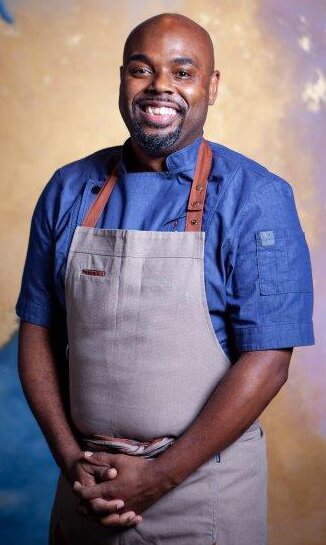Chef Gerald Sombright: It’s the people, not the places, that matter in foodservice
For Gerald Sombright, it’s not where you work that matters, but who you work with.
The Florida-based chef – the first African-American man to earn a coveted Michelin Star – deeply understands the value of surrounding yourself with people who encourage, support and challenge you to imagine what’s possible.
Sombright started his career as a dishwasher and prep cook at a St. Louis hotel, a job he says he took just to pay the bills. He was soon fascinated by the chefs he worked alongside, with their precise cuts and obsession with high-quality ingredients.
He remembers seeing an old black-and-white photo hanging on the wall there. “Is that the chef’s grandfather?” he asked his coworkers. “It’s Auguste Escoffier,” someone finally told him. “He’s the grandfather of cuisine.”

This guy must be special, Sombright thought, if his boss would hang his picture at work
“It was a pivotal moment for me,” he says, learning “that there was a lineage beyond the moment that you exist in now, that cooking is this thing that's passed down from generation to generation.”
The realization sent him down a rabbit hole as he devoured books and articles on the great chefs, all while soaking up every skill and technique he could, earning a promotion to chef de cuisine in just three years.
It was during this period that Sombright first heard about the Michelin Guide, the world’s highest honor for a restaurant chef. He set a goal then and there: “I really wanted to be able to put on my resume that I worked for a chef that had a Michelin Star.”

DISCOVER THE FIRE
inside you


After several years in St. Louis, he made it happen, relocating to Baltimore to work under Michael Mina. From there he moved on to a series of hotel restaurants throughout the U.S., learning the art of cuisine.
Then, in 2016, he was tapped to be a contestant on season 14 of “Top Chef.” Though he didn’t win the competition, he looks fondly on the “wild ride” of filming and promoting the show.
“The bond between these people was just really unique and special,” he says. “They only wanted to win if the person that they beat was able to compete at their highest level.”
Almost 10 years since filming, Sombright has kept in touch with most of his fellow competitors, who have supported each other through restaurant openings, health crises and more.
In fact, it was one of his opponents on the show, John Tesar, who invited him to partner at Knife & Spoon in Orlando during the peak of the pandemic. Pushing through shutdowns, restrictions, labor shortages and supply chain issues, they were honored in the first-ever Michelin Guide in Florida in 2022.
“It feels super full circle for me because the first thing that I ever learned was the best thing that you could aspire to in our industry,” he says. “I never thought I would even work in a city that had Michelin.”

Since earning the Michelin Star, Sombright has moved on to The Club at the Dunes of Naples, Florida, where as executive chef he can flex his creative muscles while enjoying the work-life balance and benefits of the hospitality segment.
He is proud of his place in history as the first African-American man with a Michelin, but recognizes that work ethic and a shared mission – not race, sexuality or gender – are what’s most important in the kitchen.
“There are a lot of restaurants that I've worked in where I was the only or one of two Black people there,” he says. He has experienced moments of racism in the field, but because of the camaraderie that exists, “I've never felt out of place amongst my colleagues.”
“You start to build these bonds with people who live lives differently from you,” he says, “and you start to hear their story and know who they are and depend on them.”
From the chefs who encouraged him to his peers on “Top Chef” to the colleagues he’s connected with throughout his career, Sombright values each of the relationships he’s built.
He’s proud of his place in history among a long lineage of world-class chefs – like his mentors Clay Miller, Stephen Milstein and Fabrizio Schenardi – and after decades in the industry, he’s paying it forward with the next generation of culinary leaders.
Recently, Sombright has found himself stepping into the mentorship role that was so important to his early career, talking young chefs through recipe development or offering a listening ear over a round of beers.
And he always offers this piece of advice: “Who you work for is the most important thing that will happen to you in your career.”
Because as he knows from experience it’s the people – along with a lot of hard work – that will help you achieve your wildest dreams.
Chef Gerald Sombright on dinnerware
“A plate is the canvas that is showcasing your art. … I think that plateware or silverware is enhancing the experience of the diner because it tells you how to eat. Sometimes I have in my mind what I want the dish to look like, and the plate will tell me to change how I was going to present that dish. And that happens quite often.”
